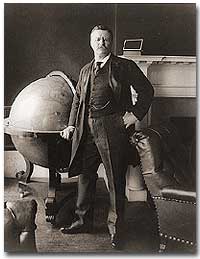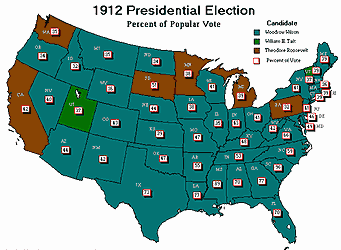43f. The Election of 1912

Politics can sometimes turn the best of friends into the worst of enemies. Such was the fate for the relationship between Theodore Roosevelt and William Howard Taft.
Roosevelt's decision to challenge Taft for the Republican nomination in 1912 was most difficult. Historians disagree on his motives. Defenders of Roosevelt insist that Taft betrayed the progressive platform. When Roosevelt returned to the United States, he was pressured by thousands of progressives to lead them once more. Roosevelt believed that he could do a better job uniting the party than Taft. He felt a duty to the American people to run.
Critics of Roosevelt are not quite so kind. Roosevelt had a huge ego, and his lust for power could not keep him on the sidelines. He stabbed his friend in the back and overlooked the positive sides of Taft's Presidency. Whatever the motive, the election of 1912 would begin with two prominent Republican candidates.
The two former friends hurled insults at each other as the summer of 1912 drew near. Taft had the party leadership behind him, but Roosevelt had the people. Roosevelt spoke of a New Nationalism — a broad plan of social reform for America.

Rather than destroying every trust, Roosevelt supported the creation of a Federal Trade Commission to keep a watchful eye on unfair business practices. He proposed a minimum wage, a workers' compensation act, and a child labor law. He proposed a government pension for retirees and funds to assist Americans with health care costs. He supported the women's suffrage amendment. The time of laissez faire was over. The government must intervene to help its people.
Taft and his supporters disagreed, and the battle was left for the delegates to decide.






